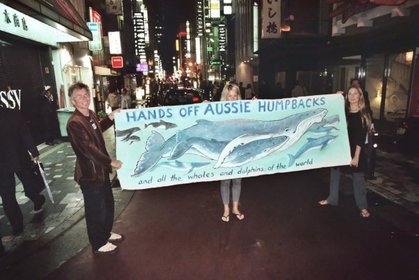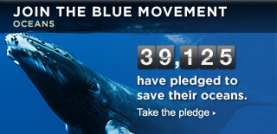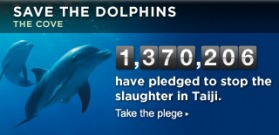However, I am still disenchanted that this year's pseudo "win" for the whales comes as nothing more than a defense strategy perhaps best left for World Cup soccer; our giant friends of the sea deserve more. Unfortunately, once again no real progress in the actual protection of the mighty mammals has taken place. Thus rogue whaling nations like Norway, Iceland and Japan will continue to get away with their annual killing sprees, and per usual, the fate of the cetacean nation lies in the hands of the direct action organizations courageous enough to try to stop these pirate poachers in their tracks. The fact is that there is no real regulatory governing body for the world's whales—it's a bloody free-for-all out there.
Veteran crew member and European Coordinator of the Sea Shepherd Conservation Society, Laurens de Groot, was on the ground in Agadir this week to send a clear message that, "Sea Shepherd rejects the IWC as the body responsible for the conservation of the world's whales."
Also at the forefront of conservationists' concern was the very real possibility of a trade off deal that would have sanctioned the reinstatement of commercial whaling in exchange for the phasing out of whaling under the false guise of scientific research in the Southern Ocean whale sanctuary.
"Allowing commercial whaling in order to get rid of the scientific loophole would be a death-blow for the whales. This would open up a new market for whale products and would be just a matter of time before other countries decided to start making money off of whales. Furthermore, since certain whale populations are still on the brink of extinction and others are at a fraction of what they once were, it is unacceptable whatsover to allow any whaling," added de Groot.
I decided to pass on attending this year's meeting; I could not stomach coming within 50 yards of people who consider exploding missile tipped harpoons into the back of fleeing mothers and calves just another honest day's work. Secondly, Agadir is a bit off the beaten track for the average North American whale-loving citizen. (Hmm, am I beginning to see a pattern here?) I also opted out of this year's bureaucratic jamboree because I experienced firsthand how ineffectual the entire process proved to be at last year's stalemate of a meeting on the small island of Madeira, Portugal.
I was not allowed into the official delegate sessions last year as my partner-in-crime at the time, Captain Paul Watson, has been banned from attending the annual meeting since he came under international scrutiny for putting half of the Icelandic whaling fleet out of commission by scuttling two of the four cetacean death rigs in Rekyavik Harbor back in 1986.
While no one was injured by the eco-vigilant acts, and Watson has never been convicted of a crime, that particular course of action seemed to ruffle a few feathers. In fact, our very entrance into the country was threatened as authorities quickly pulled up an outstanding arrest warrant dating back to the late seventies when another pirate whaling vessel, The Sierra, was sunk in Portuguese waters. Ah yes, the Good Captain has a long-standing history of putting pirates of greed and corruption out of business for good and has a far more impressive record than any other in that regard.
After several hours of detainment, we were released from custody as the 30-year warrant had luckily expired just a few months prior to our arrival. Upon signing a few autographs and snapping a few pictures with the local immigration authorities—apparently Whale Wars is a huge hit in Portugal—we were free to proceed to the hotel where the annual meeting was being held, if for nothing but to make our presence and anti-whaling stance known.
I must admit it was mildly entertaining to see the looks of panic on the faces of the Japanese and Nordic delegates as they passed Captain Watson and the modest stronghold of Sea Shepherd's crew and supporters in the main lobby—those who could make it past the tight security, that is. Apparently wearing a Sea Shepherd shirt moved you up the ranks to public enemy #1, as anyone sporting a jolly roger logo was promptly escorted off the premises.
We had outsmarted the meddlesome concierge as we had booked our hotel rooms over a year in advance and, well, you can't really tell a paying customer to go up to his room and change clothes for no legitimate reason. Yes, we must have appeared as ferocious eco-terrorists in our black organic cotton tee shirts adorned with skull and crossbones, sipping on our vegan lattes and efficiently working away on our Macbooks. All the while, cold blooded killers walked freely about socializing and exchanging niceties with delegates whose Mediterranean vacations were highly likely paid for by the Japanese government.
Japan has long been buying the votes of third world nations to back its sinister policies—everything from paid trips to the IWC, to luxury beachfront accommodations to prostitutes for delegates. Having traveled extensively up and down the Mekong, I always wondered what business or interest a landlocked country like Laos had voting on the world's whale quotas! In response to the recently exposed voting scandal, Laurens de Groot added, "With Japan being allowed to bribe its way through the IWC, there is no way the anti-whaling countries can ever win in favor of the whales. Even the hotel bill of the Vice Chairman is paid for by the Japanese government!"
Of course we did have some good fun at last year's meeting, poking fun at Japan's "scientific research" program by harpooning delegates with our spongey version of the explosive death devices. Ironically that did not sit so well with many delegates, and we were rather confused. I mean, we were only trying to simulate the act of extracting tissue samples in order to conduct in-depth research analysis on what they had eaten for lunch that day. We even got a direct hit on Peter Garrett himself, who did not seem at all amused by our antics. Apparently the former rock star turned Australian Environmental Minister's bed has been burning hotter than normal lately as he has recently crossed over from the dark side by opposing the repeal of the moratorium at this year's meeting. I am still, however, keeping my fingers crossed on that one.
I sincerely look forward to the day that the IWC pulls into a former whaling town like Byron Bay, Australia, where whales and the very sanctity of life that they represent are now respected, if not celebrated, by their evolution into the eco-tourism industry. The whales of the world deserve more than what they are currently being offered and the majority of Japanese citizens who do not support whaling also deserve the chance to restore dignity to their country's jaded reputation in the global community.
For now, I take comfort in knowing that if the Japanese government intends to continue its annual illegal bloodbath in the Southern Ocean, for which it makes absolutely no apology, it will find itself among the finest of company. And if Peter Garrett really feels that the "time has come to say fair's fair," then he should put his money where his mouth is by sending the Australian Navy to patrol the Southern Hemisphere whale sanctuary this coming commercial hunting season. What do you say, Pete?
About Deborah Bassett: Deborah is an L.A. based nonprofit consultant, environmental activist and freelance photo-journalist whose focus is to raise awareness about critically endangered species and habitats. She has worked both in the field and behind the scenes with such organizations as The Sea Shepherd Conservation Society, Amazon Watch, Rainforest2Reef, Conservation International, Surfers For Cetaceans, Global Green USA, and sits on the Board of Advisors of the Blue Seals Marine Conservation group. She is currently a contributing editor at Sea Voices, a project highlighting individuals and organizations around the world that are working toward solutions for the most critical issues facing the ocean today.

 RSS Feed
RSS Feed

















